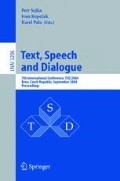Abstract
Standard stochastic grammars use generative probabilistic models, focusing on rewriting probabilities conditioned by the symbol to be rewritten. Among several other undesired behaviors, such grammars tend to give penalty to longer derivations of the same input, which is a drawback when they are used for analysis (rather than generation). In this contribution, we propose a novel non-generative probabilistic model for both Stochastic Context-Free Grammars (SCFGs) and Stochastic Tree-Substitution Grammars (STSGs), in which the probabilities are conditioned by the leaves (i.e. the input symbols) rather than by the root of the parse tree. Both theoretical and experimental improvements of these new models are presented.
Access this chapter
Tax calculation will be finalised at checkout
Purchases are for personal use only
Preview
Unable to display preview. Download preview PDF.
References
Johnson, M.: PCFG models of linguistic tree representations. Computational Linguistics 24, 613–632 (1998)
Bonnema, R., Buying, P., Scha, R.: A new probabilitymodel for Data Oriented Parsing. In: Dekker, P., Kerdiles, G. (eds.) Proc. of the 12th Amsterdam Colloquium (1999)
Rozenknop, A.: Gibbsian Context-Free Grammar for parsing. In: Sojka, P., Kopeček, I., Pala, K. (eds.) Proc. Text, Speech and Dialogue 2002, Springer, Heidelberg (2002)
Rozenknop, A., Chappelier, J.C., Rajman, M.: Gibbsian Tree Substitution Grammars. In: Jäger, G., Monachesi, P., Wintner, S. (eds.) Proc. of Formal Grammar 2003, pp. 137–148 (2003)
Rozenknop, A.: Modèles syntaxiques probabilistes non-génératifs. Ph.D. thesis, École Polytechnique Fédérale de Lausanne, Switzerland, 3 This phenomenon has been clearly observed in experiments with the lexicalized version of the treebanks (2003)
Geman, S., Johnson, M.: Dynamic programming for parsing and estimation of Stochastic Unification-Based Grammars. In: Proc. ACL 2002, pp. 279–286 (2002)
Miyao, Y., Tsujii, J.: Maximum entropy estimation for feature forests. In: Proc. of Human Language Technology Conference, HLT 2002 (2002)
Clark, S., Curran, J.R.: Log-Linear Models for Wide-Coverage CCG Parsing. In: Proc. of EMNLP 2003, Sapporo, Japan, pp. 97–104 (2003)
Clark, S., Curran, J.R.: Parsing the WSJ using CCG and log-linear models. In: Proceedings of the 42nd Annual Meeting of the Association for Computational Linguistics (ACL 2004), Barcelona, Spain (2004)
Chappelier, J.C., Rajman, M., Rozenknop, A.: Polynomial TSG: Characterization and new examples. In: Proc. of 7th Conf. on Formal Grammar, pp. 29–39 (2002)
Marcus, M.P., Santorini, B., Marcinkiewicz, M.A.: Building a large annotated corpus of English: The Penn treebank. Computational Linguistics 19, 313–330 (1994)
Lafferty, J.: Gibbs-Markov models. Computing Science and Statistics 27, 370–377 (1996)
Bod, R.: Beyond Grammar, An Experience-Based Theory of Language. CSLI Publications, Stanford (1998)
Chappelier, J.C., Rajman, M.: Polynominal TSG: an efficient framework for Data-Oriented Parsing. In: Proc. of RANLP 2001 (2001)
Dempster, M.M., Laird, N.M., Jain, D.B.: Maximum likelihood from incomplete data via the EM algorithm. Journal of the Royal Statistics Society 39, 1–38 (1977)
Goodman, J.: Parsing Inside-Out. Ph.D. thesis, Harvard University (1998)
Bonnema, R., Scha, R.: Reconsidering the probability model of Data-Oriented Parsing. In: Bod, R., Scha, R., Sima’an, K. (eds.) Data-Oriented Parsing, pp. 25–41. CSLI Publications, Stanford (2002)
Manning, C., Schütze, H.: Foundations of Statistical Natural Language Processing. MIT Press, Cambridge (1999)
Bod, R.: An efficient implementation of a new DOP model. In: Proc. EACL 2003 (2003)
Geist, A., et al.: PVM: Parallel Virtual Machine: A Users’ Guide and Tutorial for Networked Parallel Computing. MIT Press, Cambridge (1994)
Sima’an, K.: Computational complexity of probabilistic disambiguation by means of tree grammars. In: Proc. of COLING 1996 (1996)
Author information
Authors and Affiliations
Editor information
Editors and Affiliations
Rights and permissions
Copyright information
© 2004 Springer-Verlag Berlin Heidelberg
About this paper
Cite this paper
Rozenknop, A., Chappelier, JC., Rajman, M. (2004). Discriminative Models of SCFG and STSG. In: Sojka, P., Kopeček, I., Pala, K. (eds) Text, Speech and Dialogue. TSD 2004. Lecture Notes in Computer Science(), vol 3206. Springer, Berlin, Heidelberg. https://doi.org/10.1007/978-3-540-30120-2_24
Download citation
DOI: https://doi.org/10.1007/978-3-540-30120-2_24
Publisher Name: Springer, Berlin, Heidelberg
Print ISBN: 978-3-540-23049-6
Online ISBN: 978-3-540-30120-2
eBook Packages: Springer Book Archive

